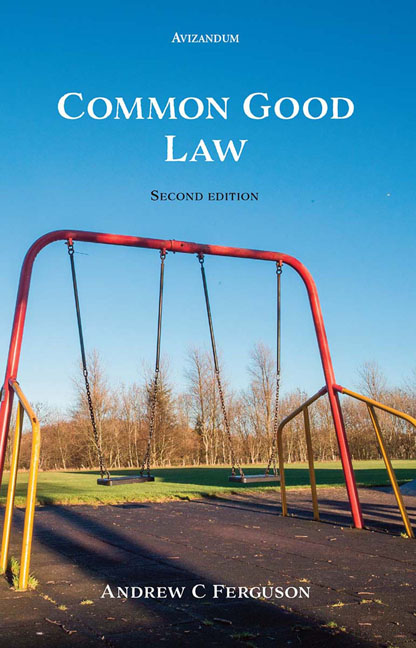Book contents
- Frontmatter
- Contents
- Preface
- Tables of Legislation
- Table of Cases
- 1 Origins and Definitions
- 2 Statutory Framework
- 3 The Administration of the Common Good
- 4 Inalienable Common Good Property
- 5 Classification of Common Good Land
- 6 Appropriation, Alienation and Disposal of Common Good Land
- 7 When Does ‘a Question’ Arise?
- 8 Factors Involved in Allowing Disposal
- 9 Taking a Common Good Case to Court
- 10 Common Good and Community Empowerment
- Appendix I List of Burghs
- Appendix II Disposal, Appropriation and Alienation
- Index
7 - When Does ‘a Question’ Arise?
Published online by Cambridge University Press: 20 October 2020
- Frontmatter
- Contents
- Preface
- Tables of Legislation
- Table of Cases
- 1 Origins and Definitions
- 2 Statutory Framework
- 3 The Administration of the Common Good
- 4 Inalienable Common Good Property
- 5 Classification of Common Good Land
- 6 Appropriation, Alienation and Disposal of Common Good Land
- 7 When Does ‘a Question’ Arise?
- 8 Factors Involved in Allowing Disposal
- 9 Taking a Common Good Case to Court
- 10 Common Good and Community Empowerment
- Appendix I List of Burghs
- Appendix II Disposal, Appropriation and Alienation
- Index
Summary
The arising question and the court's discretion
In Chapter 6, the wording of section 75 of the Local Government (Scotland) Act 1973 was seen, like its statutory ancestor, section 171 of the 1947 Act, to have been very carefully drafted as regards its uses of the words appropriation, alienation and disposal.
One phrase in section 75 - which again it inherited from section 171 of the 1947 Act - needs to be interpreted for a full understanding of what the section might mean. This is the phrase ‘land forming part of the common good with respect to which land a question arises as to the right of the authority to alienate’. It occurs in section 75(1) and (2) and its true meaning will clearly have an effect on whatever an authority has in mind in relation to common good land, whether it be appropriation, alienation or disposal. What, then, does it mean?
It is no coincidence that the phrase first appeared in the 1947 Act. In an earlier chapter, it was seen that the legislators appeared to have been influenced in their drafting of section 171 by Magistrates of’ Kirkcaldy v Marks & Spencer Ltd in putting in a subsection, removed as redundant in the 1973 Act, about former burgh chambers. In the same way, it would seem that the legislators were influenced by the Ruthin Castle case, and its dicta that almost all burgh land and buildings fell into the common good. They seem to have recognised, however, that only some properties raised questions as to the ability of the authority to alienate them: namely those properties which fell into the type of categories discussed in Murray v Forfar Magistrates.
On the face of things, that interpretation makes sense. If the land has a title dedicating it to a public purpose; if it has been dedicated to a public purpose by the authority; or if the public has, without hindrance by the authority, used the property for public purposes such as recreation on it, then a question could be said to arise. If none of the above applies, then no question arises and the authority may safely deal with the common good land as it pleases.
- Type
- Chapter
- Information
- Common Good Law , pp. 110 - 118Publisher: Edinburgh University PressPrint publication year: 2020



